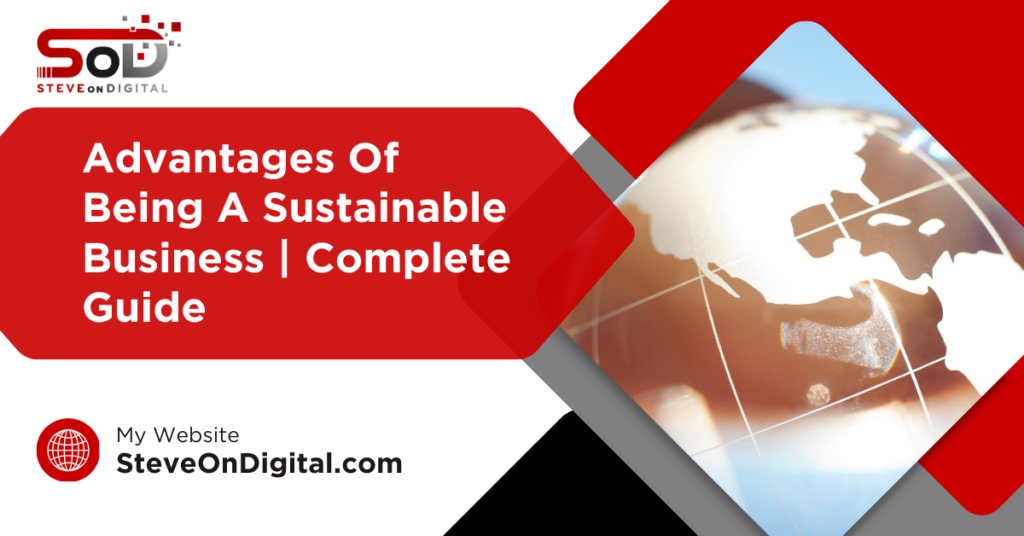Advantages Of Being A Sustainable Business | A Comprehensive Guide

Hello, I’m Steve Johnston, owner and author of SteveOnDigital, specializing in guiding small and medium-sized businesses through digital transformation. With a background in electrical engineering, an MBA, and a master’s in Project Management, I bring a depth of knowledge to help over a million business leaders optimize their digital strategies. My approach is deeply personal, reflecting my commitment to family, continuous learning, and active involvement in community and economic development initiatives. In this blog post, I will explore the profound advantages of being a sustainable business. Sustainability is more than just an environmental gesture; it is a comprehensive approach that integrates environmental, social, and economic factors into the core operations of a business. This not only aims for profitability but also fosters a thriving environment and community engagement. Over the years, I’ve witnessed the evolution of sustainable practices from niche strategies to fundamental business imperatives, driving not only growth but also fostering a resilient and adaptable future. Understanding Sustainable Business Defining Sustainable Business As I’ve observed in the digital transformation landscape, a sustainable business actively integrates environmental, social, and economic factors into its operations. This means not just aiming for profitability but also caring for the planet and people. It’s about creating a business that not only survives but thrives by respecting and enhancing the resources it depends on. Incorporating a sustainable approach into business strategies is crucial, as it underscores the importance of addressing global challenges while aiming for financial success and a positive impact on both society and the environment. Adopting a sustainable business model is key to ensuring long-term business success and resilience, as it opens up opportunities for economic growth, increases productivity, potentially cuts costs, and positions companies as leaders in tackling climate change and meeting consumer demands. Evolution Of Sustainability In The Business World From my years of experience, I’ve seen how the importance of sustainability in business has evolved from a niche advantage to a core necessity, highlighting why sustainability important is a key factor in business success today. Initially, it was about reducing waste and conserving energy, but now it encompasses sustainability initiatives aimed at leading a brand towards a more resilient and adaptable future. These initiatives have become integral to modern business strategies, focusing on long-term benefits, improving brand image, and providing a competitive advantage by appealing to conscious consumers. Companies are increasingly expected to drive not just economic growth but social and environmental progress too, with an emphasis on investing in sustainability initiatives and seeking external certifications to gain consumer trust and credibility (IMD Business School) (S&P Global). Key Advantages Of Adopting Sustainable Practices Here are some of the key Advantages. The growing consumer demand for sustainable products represents a key advantage for businesses focusing on sustainability, reflecting a significant shift in market dynamics and consumer preferences towards environmental responsibility. Environmental Benefits Of Sustainability Impact On Climate Change In my role, steering businesses towards digital efficiency often parallels sustainability goals like reducing carbon footprints. Sustainable businesses play a critical role in mitigating climate change impacts. By adopting green technologies and reducing emissions, companies can significantly lower their environmental impact. Current statistics show a pressing need for such measures as global temperatures continue to rise, threatening to break previous records (TravelPerk). Year Carbon Emissions Before (tons) Carbon Emissions After (tons) Percentage Reduction 2019 10,000 8,000 20% 2020 10,000 7,500 25% 2021 10,000 6,500 35% 2022 10,000 5,500 45% 2023 10,000 4,500 55% Waste Reduction And Resource Management Throughout my career, I’ve promoted efficiency, which directly aligns with minimizing waste. Sustainable practices involve not just waste reduction but smarter resource management. This means using materials more efficiently and finding ways to recycle or repurpose what we can no longer use. This approach not only protects the environment but also optimizes operational efficiency, reducing costs in the long run (TravelPerk). Economic Impacts Of Sustainability Cost Savings And Operational Efficiency From my experience, integrating sustainable practices leads to significant cost savings. These savings are primarily due to increased operational efficiency, such as using less energy or reducing waste, which in turn lowers operational costs. Moreover, sustainable companies are often eligible for various incentives from governments and other organizations, which can further reduce expenses (TravelPerk). Additionally, adhering to the government’s legal requirements for sustainability not only helps in avoiding costly penalties but also streamlines business operations, further enhancing cost-effectiveness and operational efficiency. Year Operational Costs Before ($) Operational Costs After ($) Cost Savings ($) 2019 1,000,000 950,000 50,000 2020 1,000,000 900,000 100,000 2021 1,000,000 850,000 150,000 2022 1,000,000 800,000 200,000 2023 1,000,000 750,000 250,000 Competitive Advantage And Market Position Being a sustainable business can also give a competitive advantage in today’s market. Global consumers, especially millennials, are increasingly making purchasing decisions based on the sustainability of products and services, showing a willingness to change their consumption habits for environmental sustainability. By aligning with these values, companies can not only attract a broader customer base but also enhance their market position and brand image (TravelPerk). Metric Before Sustainability After Sustainability Improvement Market Share (%) 15% 25% 10% increase Customer Base Growth 1,000 2,000 100% increase Social And Corporate Benefits Here I have written some key Social And Corporate Benefits. Investing in sustainability initiatives is pivotal for achieving social and corporate benefits, including enhancing brand reputation and attracting talent. A productive workforce plays a crucial role in attracting and retaining talent, as employees aligned with the company’s sustainability values and mission are more engaged and motivated, contributing significantly to the company’s growth and sustainability goals. Building A Responsible Brand Enhancing Corporate Reputation As I navigate the digital landscape with my business, SteveOnDigital, I’ve seen firsthand how integrating sustainability into our operations not only supports the planet but also significantly boosts our brand’s reputation. Investing in sustainability initiatives is a key strategy in this regard, as it not only demonstrates a commitment to environmental and social values but also enhances corporate reputation and fosters customer loyalty. Consumers today are more informed and conscientious than ever; they seek out

